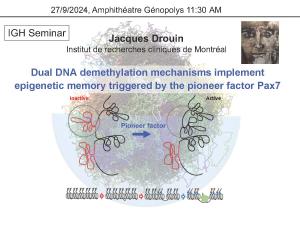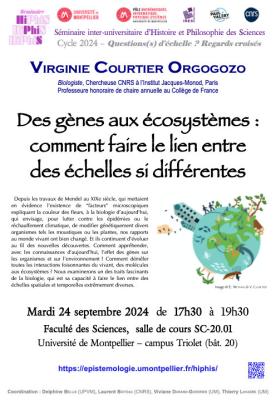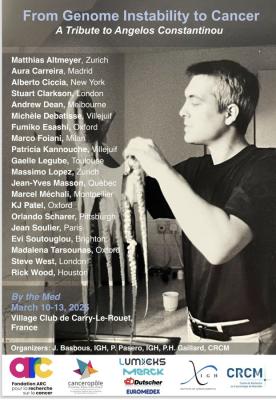Orateur:
Jacques DROUIN (Institut de recherches cliniques de Montréal)
Genopolys Amphitheatre

Dual DNA demethylation mechanisms implement epigenetic memory triggered by the pioneer factor Pax7
Contact IGH Giacomo CAVALLI
Chromatine et Biologie Cellulaire
Orateur:
Virginie Courtier-Orgogozo
IGH seminar room
Evolution of Drosophila glue, a promising system for biomimetic applicationsVirginie Courtier-Orgogozo is a research director at the CNRS, she leads a team at the Institut Jacques Monod in Paris (https://courtier.ijm.fr/), she is an invited professor at the Collège de France (https://www.college-de-france.fr/fr/chaire/virginie-courtier-orgogozo-biodiversite-et-ecosystemes-chaire-annuelle/)
Contact IGH Isabelle BUSSEAU
Orateur:
Nick Gibert (Medical Research Council Human Genetics Unit at the University of Edinburgh)
Genopolys
Regulation of large-scale chromatin architecture in human cells
Nick started his career as a PhD student in the biochemistry department at Edinburgh University, and continued his training as a postdoc with Professor Wendy Bickmore. He started his lab in the Edinburgh Cancer Research Centre in 2006 with a fellowship from the Wellcome Trust and moved to the Human Genetics Unit in 2012 funded by an MRC Senior Fellowship. Nick is currently an MRC Investigator and holds a Wellcome Investigator award.
Contact IGH Severine CHAMBEYRON
Vous devez vous connecter pour accéder aux informations personnel IGH
Orateur:
Wei Xie (Tsinghua University, Beijing)
Genopolys Amphitheatre
Decoding the transcription circuitry in early mammalian development
Contact IGH Bernard DE MASSY
Méiose et recombinaison
Orateur:
Pengyi YANG (University of Sydney, Australia)
IGH seminar room
Computational methods for stem cell biology and engineeringComputational methods are essential for characterising molecular programs that control cell-identity and stem cell-fate decisions. In this seminar, I will present our research on developing and applying computational methods for studying stem cells and stem cell-derived organoids. This will be followed by some initial results from using this knowledge and methodologies for cellular conversion and cell-fate engineering, a key foundation for tissue engineering, disease modelling, and regenerative medicine.
Contact IGH Andrew OLDFIELD
Biologie des éléments régulateurs distaux
Orateur:
Carissa CHEN (University of Sydney, Australia)
IGH seminar room
Computational systems approaches to spatial and multi-omics analysis of tissues and organoid modelsDefining the molecular networks orchestrating human brain formation is crucial for understanding neurodevelopment and neurological disorders. In the first part of my talk, I will present my research work on elucidating the molecular programs that drive this highly dynamic process by reconstructing molecular networks that control human cerebral organoids formation using trans-omics data. Next, I will focus on spatial transcriptomics data analysis and present our findings on comparing methods for detecting...
Contact IGH Andrew OLDFIELD
Biologie des éléments régulateurs distaux
Orateur:
Thomas Surrey (CRG, Barcelona, Spain)
Genopolys amphitheater
In vitro reconstitutions reveal mechanisms of microtubule nucleation and organization during mitosis
Contact IGH Krzysztof ROGOWSKI
Orateur:
Pr. Didier TRONO (Ecole Polytechnique Fédérale de Lausanne)
IGH seminar room
Orateur:
Sonia Garel (IBENS, ENS, Paris, France)
Genopolys amphitheater

Immune cells in the choreography of cerebral developmentLa neurobiologiste Sonia GAREL, Professeure au Collège de France et Membre de l’Académie des Sciencesdirige depuis 2008 l'équipe « Développement et plasticité du cerveau » au sein de l’Institut de biologie de l’ENS (IBENS).Sonia Garel est pionnière dans l’étude des mécanismes qui contrôlent l'assemblage des circuits neuronaux du cerveau antérieur pendant l'embryogenèse et le développement postnatal.Ses fascinantes recherches montrent que l’activité cérébrale est régulée par des cellules immunitaires,...
Contact IGH Jean-Maurice DURA
Orateur:
John Diffley (Crick Institute, Londres)
Genopolys Amphitheatre

DNA Replication Forks and the DNA Damage CheckpointLe mardi 4 juin, à l'Amphithéâtre Genopolys, à 11h30, nous aurons un séminaire passionnant sur les dommages et la réplication de l'ADN par John Diffley (Crick Institute, Londres), « DNA Replication Forks and the DNA Damage Checkpoint ». John Diffley, directeur associé du Francis Crick Institute de Londres, est un pionnier dans le domaine de la réplication et des dommages causés à l'ADN. Ses recherches pionnières ont permis de caractériser la réplication de l'ADN et à reconstituer in vitro ses...
Contact IGH Marcel MECHALI
Réplication et Dynamique du Génome



